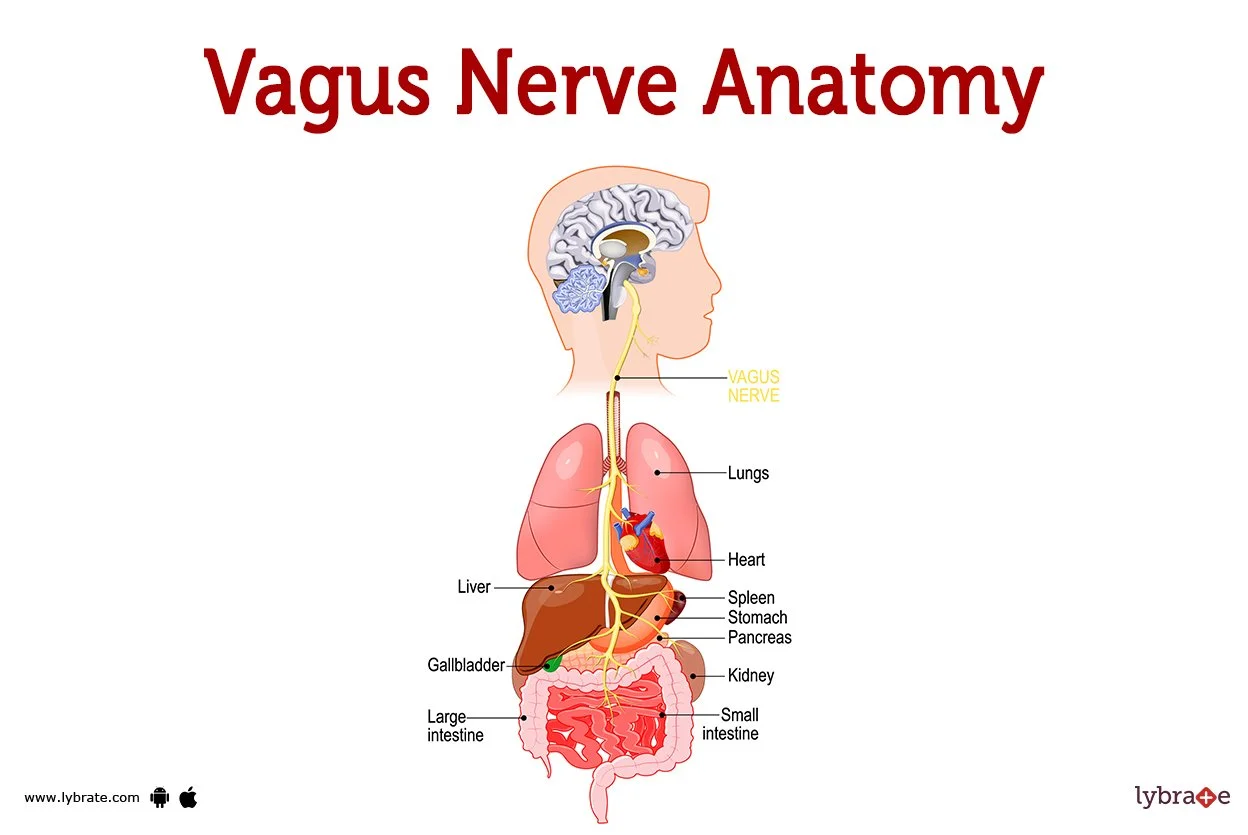Vagus Nerve - Part 1
Meet Your Vagus Nerve
Part 1: Meet Your Healing Superpower – The Vagus Nerve
You’re not broken—your body is doing its best to protect you.
If your body’s been feeling off, like you’re walking around with your shoulders up to your ears, your stomach doing gymnastics, or your sleep feeling more like a nap than actual rest…it’s not your fault.
You’re likely dealing with a nervous system that’s stuck in high alert.
And one of the biggest players in that story is a long, wandering nerve called the vagus nerve. And once you understand what it is and how it works, a lot of things about your body (and how it’s been reacting lately) start to make sense.
So… what is the vagus nerve?
The vagus nerve is the longest cranial nerve in your body, and it’s a big deal. It starts at the base of your brain and winds its way down through your face, throat, heart, lungs, and into your digestive organs.
The word vagus actually means “wandering” in Latin—and that’s exactly what it does.
It’s the communication superhighway between your brain and your body, constantly sending messages back and forth.
About 80% of the nerve signals travel from your body to your brain, not the other way around.
That means your brain isn’t just calling the shots. Your body is doing a whole lot of the talking.
This nerve plays a starring role in your parasympathetic nervous system—the “rest and digest” side of your body’s stress response. When your vagus nerve is working well, it helps calm your heart rate, regulate your digestion, reduce inflammation, balance your mood, and make you feel safe.
So yeah… it’s kind of important :). But our society has normalized (and often celebrates) stress, so it’s an often forgotten part of health.
The two sides of your nervous system
Your nervous system has two main modes. Your body moves from one state to another automatically, you don’t have a lot of control over this:
Sympathetic: This is your “fight, flight, freeze, or fawn” state. Great if you’re running from a bear, not so great if you’re just trying to make dinner or go to sleep.
Parasympathetic: This is your “rest, digest, and heal” state. This is where we want to live most of the time—because this is where healing happens.
Your vagus nerve is the on-ramp to the parasympathetic state. When it’s activated, your body gets the signal: “We’re safe. It’s okay to exhale”.
This means you can digest that meal, you can sleep tonight, and you can stop bracing.
But when the vagus nerve isn’t functioning well (or when it’s been overwhelmed for a long time) your body stays stuck in stress mode, even when you’re not in any real danger. Your system doesn’t get the memo that it’s okay to calm down.
This is extremely common in our world. Many of us were born with a nervous system that’s wired to stay in the stressed out state. But, you can rewire your nervous system once you realize this is happening :).
And, if you’re anything like me, you might not realize you’re stuck in a stress mode.
I actually thought I was a calm and chilled out person for most of my life (I have ZERO chill). Just because I’m the most relaxed person in my very anxious family, doesn’t make me actually relaxed.
Once you know your natural state, that awareness starts to change things. I NOW know how to find calm, but I had to first embrace my lack of chill before I could find calmness :). This masterclass can help you get there :).
What your vagus nerve does (and why you should care)
Here’s just a short list of what your vagus nerve helps regulate:
Digestion: It controls stomach acid, enzyme production, peristalsis (how your food moves through your system), and even hunger/satiety signals.
Mood + emotional regulation: It helps produce calming neurotransmitters like GABA and serotonin.
Heart rate + blood pressure: It supports cardiovascular health by helping your heart respond appropriately to stress.
Inflammation control: A healthy vagus nerve keeps your immune response in check so you’re not always on fire internally.
Breathing + relaxation: It’s deeply tied to your ability to breathe fully and calm yourself through your breath.
If your vagus nerve is out of balance, these systems can all feel wobbly. You might notice things like bloating, anxiety, food sensitivities, chronic pain, or just a constant feeling of being on edge… and not really knowing why. That’s because your nervous system is holding the tension, even if your mind is saying, “I’m fine.”
Your body is just stuck
Here’s the reframe I want you to carry with you throughout this masterclass: Your symptoms aren’t random or wrong. They’re your body’s way of trying to protect you.
The vagus nerve is one of the keys to helping your system come out of that protective state and move back into healing. And no, you don’t need fancy tools or a five-step protocol to do it. Just a little understanding, a little support, and a lot of kindness.
Coming up in Part 2:
We’ll look at the signs that your vagus nerve might be out of balance—and how this could be showing up in ways you haven’t connected yet.
If you have any questions, jump to our private Facebook Group or the Ask Lisa page :)

